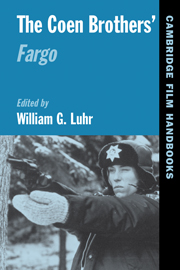Book contents
- Frontmatter
- Contents
- Acknowledgments
- Contributors
- 1 Introduction
- 2 Fargo in Context: The Middle of Nowhere?
- 3 Motherhood, Homicide, and Swedish Meatballs: The Quiet Triumph of the Maternal in Fargo
- 4 Fargo, or the Blank Frontier
- 5 ‘Kinda Funny Lookin’”: Steve Buscemi's Disorderly Body
- 6 Fargo: “Far Removed from the Stereotypes of …”
- 7 Closer to the Life Than the Conventions of Cinema: Interview with the Coen Brothers (conducted in Cannes on May 16, 1996)
- 8 Cold-Blooded Scheming: Roger Deakins and Fargo
- 9 Carter Burwell in Conversation: Music for the Films of Joel and Ethan Coen
- 10 Review of Fargo
- 11 Prairie Home Death Trip
- Filmography of Joel and Ethan Coen
- Selected Bibliography
- Index
4 - Fargo, or the Blank Frontier
Published online by Cambridge University Press: 07 December 2009
- Frontmatter
- Contents
- Acknowledgments
- Contributors
- 1 Introduction
- 2 Fargo in Context: The Middle of Nowhere?
- 3 Motherhood, Homicide, and Swedish Meatballs: The Quiet Triumph of the Maternal in Fargo
- 4 Fargo, or the Blank Frontier
- 5 ‘Kinda Funny Lookin’”: Steve Buscemi's Disorderly Body
- 6 Fargo: “Far Removed from the Stereotypes of …”
- 7 Closer to the Life Than the Conventions of Cinema: Interview with the Coen Brothers (conducted in Cannes on May 16, 1996)
- 8 Cold-Blooded Scheming: Roger Deakins and Fargo
- 9 Carter Burwell in Conversation: Music for the Films of Joel and Ethan Coen
- 10 Review of Fargo
- 11 Prairie Home Death Trip
- Filmography of Joel and Ethan Coen
- Selected Bibliography
- Index
Summary
The Coen brothers' comic crime drama Fargo (1996) is so appealing perhaps because it is so wittily involved in a critique of American civilization, particularly the late twentieth-century family and community. In this, the Coens share common interests with the quasi-independent cinema of the past 30 years, represented by such diverse films as Blue Velvet (1986) and Happiness (1997). The Coens played with such a critique in their earlier explorations of genre film, especially Blood Simple (1983), Miller's Crossing (1990), and the comedy Raising Arizona (1987). As with much postmodern art, a concern for eccentric stylization, a preoccupation with genre convention that borders on fetishization, and above all a form of cynicism and snide sarcasm (basic to their humor) tend both to enhance their comedy and blur the credibility of their observations. Like David Lynch, Todd Solondz, and other postmodernists, the Coens approach their material from a bemused distance, with the sense that sympathy for their characters (and for humanity) may be the earmark of the sucker (the worst thing to be in the hip posture of postmodernity), to the point that their critical perspective is often difficult to ascertain. The Coens also share, perhaps precisely because of this apparent sensibility, an inability to suggest a sense of an alternative to what they critique. What some critics see as an element of the ineffable in their work may be their refusal to take their material seriously or, worse, their tendency to view the world with haughty disdain that their jokes barely mask.
- Type
- Chapter
- Information
- The Coen Brothers' Fargo , pp. 55 - 76Publisher: Cambridge University PressPrint publication year: 2003



